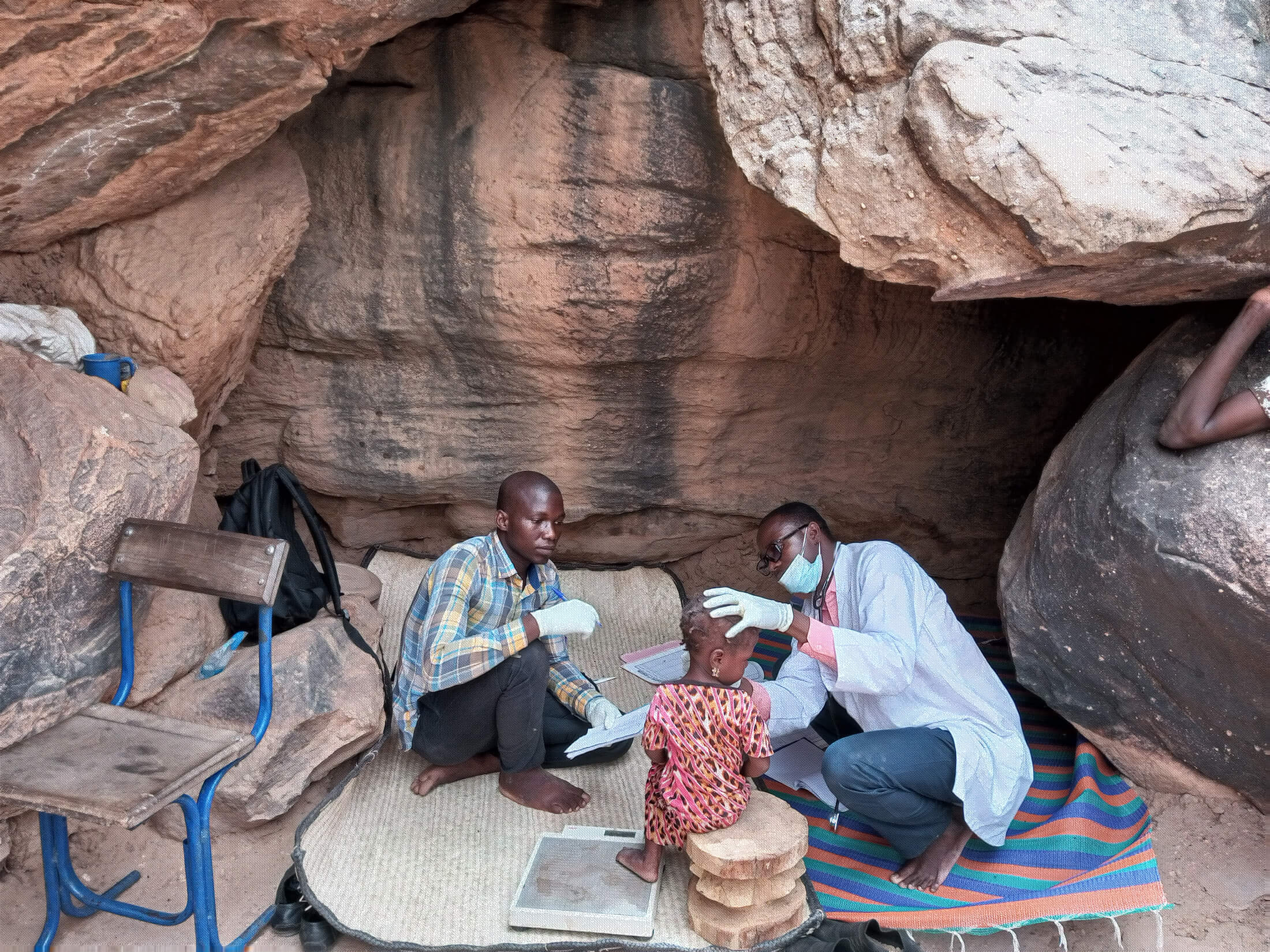Offering Vital Nutrition Services in Gaza
In Gaza, the past year of conflict has left most families struggling to access food, with three-quarters of the population relying on aid. Local food production has collapsed, leading to widespread malnutrition among children. Seven-year-old Jana, who was severely malnourished, is just one example. Treated at International Medical Corps’ field hospital in Deir Al Balah with therapeutic foods, she is slowly recovering, but many other children face similar threats to their survival.
To address the growing hunger crisis, International Medical Corps launched the “Find and Treat” campaign in July to identify and support children suffering from malnutrition and train local community health workers. We have distributed 100 metric tons of therapeutic food across Gaza, focusing on reaching children in the hardest-hit areas.




We are also working to strengthen local health systems and provide long-term support to vulnerable children like Jana. The challenges are extensive with the ongoing conflict, but we remain committed to saving children’s lives in Gaza—and around the world.
Responding to Hurricanes Helene and Milton in the US
Hurricane Milton, which made landfall on October 9, came on the heels of Hurricane Helene, which ravaged the Southeast just two weeks prior. We have been on the frontlines in the Southeastern US since before Hurricane Helene made landfall, prepositioning supplies and working with local partners to provide critical relief.



We continue our response to both hurricanes across Florida, Georgia, North Carolina and Tennessee. To date, we have shipped and distributed more than 11,500 hygiene and wound-care kits, as well as nearly 19,000 hygiene and emergency items, to 77 sites—including health facilities and relief centres—across the region.




We’re providing medical and mental health services to people staying in shelters in Asheville, North Carolina, with the help of 29 volunteers, including nurses, doctors and social workers. Since October 13, the team has conducted 152 medical consultations and 72 mental health consultations. They have also helped with vaccinations and COVID/flu testing. The devastation is catastrophic, and recovery will take time. As cold weather sets in and illnesses rise, we’re working closely with local health officials and the Red Cross to create long-term solutions for shelter residents.
Delivering Lifesaving Healthcare to Remote Communities in Mali
International Medical Corps has been working in Mali since 2013, after political instability and violence disrupted healthcare and caused mass displacement. The conflict worsened health and nutrition issues—especially in the north—and increased the risk of sexual violence for women and girls.


In response, we’re providing vital services in nutrition, healthcare for mothers and children, family planning, and protection against gender-based violence. We operate in six regions, support 109 health centres and run safe spaces for women and girls, reaching more than 425,500 people.

We currently operate a mobile medical unit (MMU) for people displaced by the conflict. The MMU provides health consultations, child vaccines, nutrition screenings, mental health services and more. We’re there—no matter where.
Celebrating the 10,000th Baby Born at Azraq Refugee Camp
Our team of doctors and midwives at the Azraq refugee camp in Jordan recently delivered the camp’s 10,000th baby, a little girl named Hala.


When the camp first opened, there wasn’t a place for women to give birth, so they had to be taken to a hospital far from their families. To fill that gap, International Medical Corps built a fully equipped maternity ward in the camp. Today, our staff delivers about 90 babies every month. Our doctors and midwives care for pregnant women, help with regular deliveries and provide emergency care for mothers and newborns.
“I have had all of my five children at International Medical Corps’ hospital—I am very happy with its services,” says Hala’s mother, Kafiah, who arrived at the camp in 2015.


In addition to maternity services, our team provides 24/7 healthcare services to 42,000 Syrians at Azraq camp. From emergency obstetric care to paediatric services, we’re there in times of need.
Providing Water, Sanitation and Hygiene Services in Cameroon
We began working in Cameroon in 2008 in response to a large number of refugees from the Central African Republic crossing Cameroon’s eastern border. Today, Cameroon hosts more than 579,000 internally displaced people and refugees.
Our staff supports healthcare facilities across five regions and provides medical care directly through health facilities, community health services and mobile outreach. We recently partnered with the Norwegian Refugee Council, who helped improve hygiene in health facilities, which reduced waterborne diseases.




International Medical Corps focuses on teaching good hygiene techniques, like handwashing, which helps prevent skin conditions. Clean drinking water helps lower diarrhoea cases, a significant health issue in the areas where we work. Environmental hygiene is also essential, as clearing water pools prevents mosquitoes from breeding, which reduces malaria. Our team hosts events to reduce the number of hygiene-associated deaths.
Learn more about International Medical Corps
Follow International Medical Corps on Facebook, Twitter, Instagram, LinkedIn, TikTok, Threads, Bluesky and YouTube.
Are you a journalist looking for information?
International Medical Corps is a global first responder that delivers emergency medical and related services to those affected by conflict, disaster and disease, no matter where they are, no matter the conditions. We also train people in their communities, providing them with the skills they need to recover, chart their own path to self-reliance and become effective first responders themselves. Established in 1984 by volunteer doctors and nurses, we are a nonprofit with no religious or political affiliation, and now have more than 8,000 staff members around the world, 96% of whom are locally hired. Since our founding, we have operated in more than 80 countries, and have provided more than $4.2 billion in emergency relief and training to communities worldwide.
Our staff includes experts in emergency medicine, infectious disease, nutrition, mental health, maternal and infant health, gender-based violence prevention and treatment, training, and water, sanitation and hygiene, all within the humanitarian context.
To arrange an interview on or off the record, contact our Media Relations team at media@internationalmedicalcorps.org.
